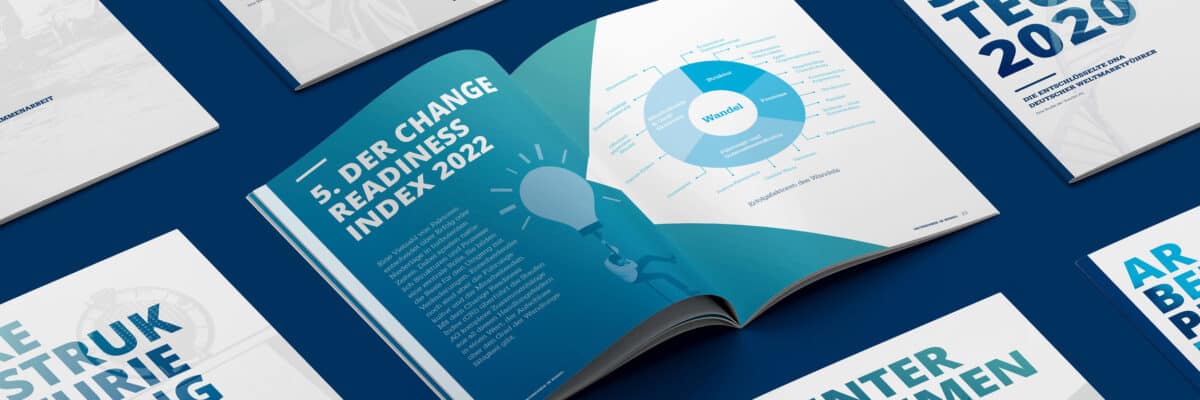
Go into Greater Depth
Our Studies, White Papers and industry papers
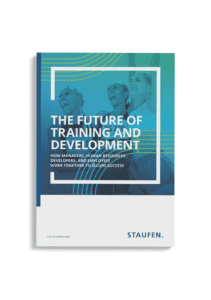
Study: The Future of Training & Development
How managers, those responsible for personnel development, and employees work together to ensure effective training and development
The Staufen 2023 study “The Future of Training” reveals that employees, managers, and those responsible for professional development must work together to design a continuous learning process and advance further training and development effectively.
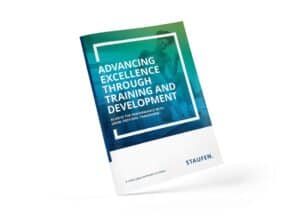
White Paper: Advancing excellence through training and development 2023
GROW. PERFORM. TRANSFORM to peak performance
In today’s competitive environment, continuous learning and training have become essential for personal and professional development. Our white paper examines the importance of developing skills and how training programs can help people reach their full potential while helping the company remain ready for the future.
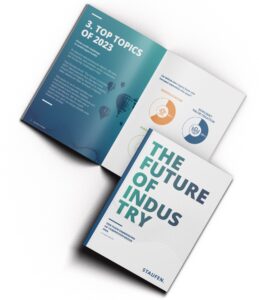
Study: Future Industry
THE FOUR DIMENSIONS OF COMPETITIVENESS
Becoming digital, efficient, sustainable, and resilient all at once is a major challenge for many companies today.
However, the Staufen “Future Industry” study shows that boards and management teams in industry have clearly set their strategic compass. The foundation for a sustainable, change-ready and resilient business is and will remain operational and digital excellence. When set up in this way, a multi-faceted challenge for a company can become a multi-faceted opportunity.
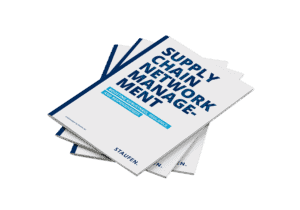
White paper: Supply Chain Network Management 2023
BOOSTING ROBUSTNESS, RESILIENCE AND RESPONSIVENESS
What does the stable supply chain network of tomorrow look like? Those who come out on top will be supply chain networks that at their core have three capabilities: Robustness, responsiveness and resilience.
All reconfiguration measures are geared towards strengthening these three capabilities. Companies then benefit from the fact that a robust network has suitable measures in place to protect them against events with a lower severity and enables continuous operation. The more responsive the network is, the quicker the company is capable of making suitable adjustments and to continue with the performance.

White Paper: Go GREEN 2022
COMPETITIVENESS AND FUTURE ASSURANCE
Heat records, forest fires, dried-up rivers and lakes — climate change caused by greenhouse gas (GHG) emissions can no longer be ignored. In Germany, industry is responsible for around one-fifth of GHG emissions. According to the German Federal Ministry of Economics and Climate Protection, two-thirds of these emissions are generated during energy production, while one-third is released during the manufacture of products in the metal and chemical industries, for example.
While such process-related emissions – methane, nitrous oxide and fluorinated gases in addition to carbon dioxide (CO2) – are mostly unavoidable, the CO2 emitted by burning fossil fuels to generate electricity and heat can very well be reduced or even completely avoided. This is the reason why the German government is pushing for the conversion to a climate-neutral industrialized country – across the entire value chain.
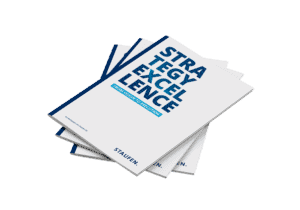
White Paper: Strategy Excellence
How to make the future happen
The question currently arises as to why the topic of strategy is just now gaining renewed attention among many companies. In our opinion, this is due to two developments: First, external influences such as political decisions or shorter technology cycles on companies and their market environment have significantly increased in strength and speed in recent years. As a result, the added value that companies create for their customers is coming under much more rapid and sustained pressure than it was a few years ago. Second, many companies are increasingly struggling to implement strategic initiatives. According to recent studies, the rate of ineffective strategic initiatives is around 50%. This represents a waste of resources that companies can no longer afford.
For companies, it follows from these two developments that they must implement excellent strategy development and deployment processes to ensure their long-term success in the marketplace.
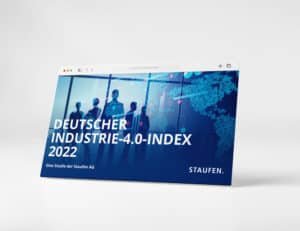
Study: German Industry 4.0 Index 2022
Staufen AG has compiled the German Industry 4.0 Index every year since 2014. Thus, the metric is nearly as old as the term Industry 4.0 itself. The 2022 index indicates that the German economy is threatening to split down the middle. 2, the German Industry 4.0 Index was compiled as part of the study “Companies in Transformation.”
For this, we surveyed a total of 363 companies in Germany in the fall of 2021, a good two-thirds of whom are from the mechanical and plant engineering industry, the electrical industry, and the automotive sector.

Industry paper: Food
Apart from the large retail chains, the food sector in Germany is generally characterized by numerous small and medium-sized companies. Most of them have no experience with lean management to date. Producing small batches, delivering just-in-time and responding flexibly to customer wishes is therefore difficult for them to imagine.
Currently, the food industry is dominated by overproduction and excessive inventories. And that has a number of negative effects.

Study: Green Transformation in Mechanical and Plant Engineering
In mechanical engineering, experts currently see three megatrends, which must be combined at companies. Sustainability, digitalization, and systems engineering. According to expert opinions, in order to be able to guarantee comprehensive sustainability, mechanical engineering must work symbiotically with its customers. It is only possible to tackle systematic tasks such as the circular economy by uniting system builders and operators.
So that the green transformation succeeds, companies and their suppliers must cooperate more closely and increase their readiness for transformation. As the results of the study show, it’s likely that not all companies will succeed.

Industry Paper: Private Equity
Financial investments are in demand – now more than ever.
When it comes to analyzing a company’s numbers, financial investors are unreservedly among the professionals. But that doesn’t mean they also have a profound understanding of what is happening on the factory floor. The opinion of the companies surveyed in this private equity study clearly shows: financial investors are valued for their important role and are readily chosen as partners.
At the same time, however, companies would like to see more dialogue at eye level and a better understanding of the peculiarities of their respective industries. Yet, only if partners are on equal footing with mutual respect can the mix of entrepreneurial creativity and financial expertise with a strong capital base realize its full potential. – to the benefit of all involved.

Study: Companies in Change
Change Readiness Index 2022
The German economy is under continuing pressure to transform. Yet, the current Change Readiness Index shows that companies have only been able to increase their ability to change slightly in recent years, despite turbulent times. Many measures that had to be implemented at speed during the COVID-19 pandemic have so far quite obviously had no deep impact.
Processes, structures, employee qualifications, leadership and corporate culture – everything that has shaped companies to date continues to be put to the test. If companies want to emerge successfully from the transformation, they must look beyond acute challenges and work intensively on their ability to change.

Study: Green Transformation 2021
There’s no more hesitating when it comes to the green transformation – a harsh realization the industry has had to come to terms with. Companies like to believe they’re at an advantage over other industries. Yet, despite their marked success, the following still remains true: the automotive industry is not going to evolve into an exemplary green industry overnight. It’s a long – and, to a degree, also very arduous – process. However, increasingly stringent requirements and growing societal pressure have set a process in motion that is gradually but surely accelerating.
The path to emission- and CO2-free production will require the industry to reflect on their core strengths: an engineering spirit, courage, and commitment.

White paper: Process Automation 2021
HOW COMPANIES ARE REALIZING THE BENEFITS OF DIGITIZATION
For companies, the focus of most digitization measures is on performance. Modern digital technologies for process automation help achieve this goal.
Increasing efficiency, achieving greater transparency and reducing costs – according to the Industry 4.0 Index surveyed by Staufen AG, the majority of companies primarily pursue these three goals with digitization. The means to achieve this are modern technologies that focus on simple implementation and application.

Study: Restructuring 2021
The Road to Success is a constant Construction Site
The spectrum of challenges to be mastered at the same time ranges from digitalization and corporate and leadership culture to cost and financing issues. Predictive restructuring is the key to ensuring that these factors that impact the success of a company do not turn into major construction sites that have to be managed simultaneously.
In essence, it is about establishing a clear process that holistically puts the future viability of their own company to the test. And to do so when there are no clearly visible cracks.
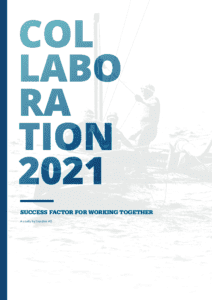
Study: Collaboration 2021
In our “Collaboration” study, we delved deeper into collaboration as a factor for success: We were curious about how companies organize collaboration in difficult times to stay on track. In cooperation with Valuestreamer, we surveyed 326 German companies in spring 2021. For international cross-comparison, companies from China, Brazil and Central Eastern Europe also participated in the survey.
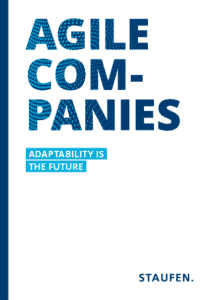
White paper: Agile Companies
Studies show that only about 10 percent of companies are able to profitably grow over a longer period of time.1 One of the reasons for this is the increase in complexity due to the penetration of new markets, in addition to the constant drive for product innovation and development of new customer potential. As a result, companies often focus on their internal processes and establish administrative structures, on the one hand to organize this complexity in the corporate environment, and on the other hand to “put things in order” internally. This order often turns into bureaucracy – and bureaucracy can be crippling. Companies as a result gradually lose their original founder’s mentality that originally led them to success. Establishing organizational structures sometimes has exactly the opposite effect of what was originally intended: Internal structures can no longer cope with external complexity and are not primarily oriented towards the value creation process; they develop their own logic (“silo thinking”) and complexity.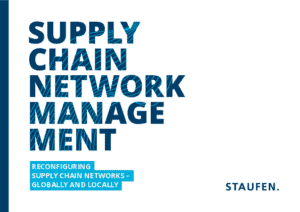
White paper: Supply Chain Network Management
Measures for optimization are mostly concentrated on internal processes. In contrast, the company’s own value-added network of increasingly numerous partners is far too rarely in focus. This is a mistake, because in crisis situations it becomes clear that numerous companies have to reconfigure their supply chain. We think holistically: classic supply chain management becomes supply chain network management.
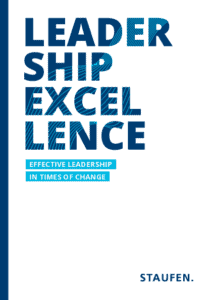
White paper: Leadership Excellence
In times of fast and even disruptive change, an organization’s ability to adapt is an absolute success factor. Strategies, structures and processes form the basis for managing change. But without effective leadership and a corporate culture that embraces a pioneering spirit and individual responsibility, nobody can look to the future with confidence. Along with the development and qualification of employees, leadership and culture form the inner program with which an organization can face change.Those who create a shared vision, build a trustful team spirit, establish communication channels and know the employees including their strengths and weaknesses, will handle tomorrow s challenges well.
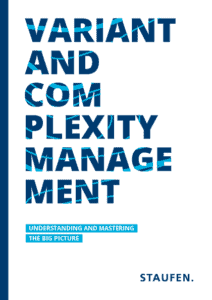
White paper: Variant and complexity management
Digitalization and globalization are intensifying competition and putting medium-sized and manufacturing companies in particular under great pressure. In addition, new competitors are entering the market and causing difficulties for even established players. Many companies are trying to attract existing customers and new customers through an ever-expanding product range. Furthermore, possibilities for individualization and customization create an almost “infinite variety” of offers. But also the internal drive of development engineers to create ever better, more efficient technical solutions leads to new variants on the component side. As a result, complexity is increasing throughout the company, which is reflected in ever complex processes along the entire value chain. The supposed advantages on the market side – in particular increased sales – are increasingly being eroded by rising production costs.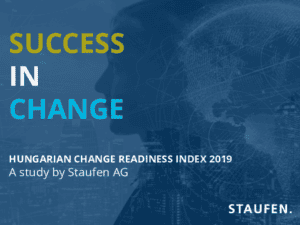
Study: Success in Change
In companies, structure, processes, management and corporate culture as well as employees and their qualifications must adapt towards change, only then can technological solutions promise success. The study “Success in Change – Hungary” shows that there is still room for improvement in these areas in the Hungarian economy. Companies are not yet ready for rapid changes.
Study: Best Strategy 2020
What is the secret to long-term corporate success?
We have decoded the DNA of the model companies and our analysis has identified recurring parameters in these top enterprises. They can be bundled together to form the 7 characteristics of the world market leaders.
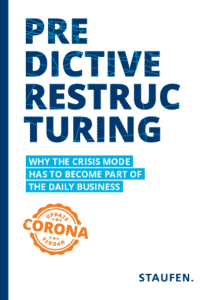
White Paper: Predictive Restructuring 2020
Looking back from today’s perspective, the banking crisis of 2008/2009 was harmless. What’s more: After that crisis, the only way for the German economy was up. Yet, towards the end of the boom phase, we were already seeing an increase in crisis symptoms. The huge emerging trends digitalization, e-mobility and sustainabilitywere setting the stage in many market segments for impending up heaval – a risk cocktail was being whipped up.
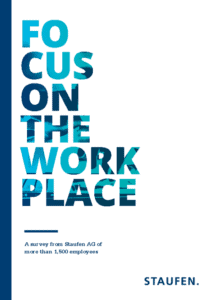
Study: Fokus on the workplace 2020
Of the satisfied employees, 66% stated that nice colleagues were responsible for liking their job. 63% noted interesting tasks, and almost 50% said it was due to a good salary. Only 23% of employees attributed their satisfaction to good leaders. Accordingly, only about one in five employees fully considers their supervisor as part of the team. The rest still feel they are partially or even exclusively being led by a traditional boss, who remains distant to the team.
International Study: Reset after the Shutdown 2020
Measures introduced around the world to contain the Covid-19 pandemic are developing into a long-term stress test for the industry. 56 percent of companies assume that they will not be able to resume work like before the shutdown until the end of the year at the earliest, or even over the course of next year. According to the current study “New start after the 2020 shutdown,” however, seven percent of companies fear they will not be able to hold out that long. Management consultancy Staufen interviewed more than 730 companies in April for the study. Participants came from Germany, USA, China, Brazil, Mexico, Switzerland, Italy, Poland, Hungary, Czech Republic, Slovakia, and Romania.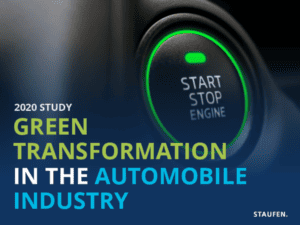
Study: Green Transformation in the automobile industry 2020
The potential for ecologically sustainable management has yet to be exhausted in the automotive industry Nine out of ten companies still have some catching up to do in this regard, as is clearly shown in the recent study “Green Transformation in the Automotive Industry”. To find out, the automotive experts at the management consultancy Staufen surveyed more than 250 OEMs and suppliers from the automotive industry in Germany.
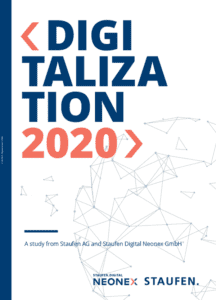
Study: Digitalization 2020
A study from Staufen AG and Staufen Digital Neonex GmbH
For more than two decades, digitalization has been influencing our society, making everyday life much easier, speeding up our economy, and enabling new business models and sources of profit. Nevertheless, the power of persistence was previously much greater than the need to introduce long overdue change – precisely in processing industry….
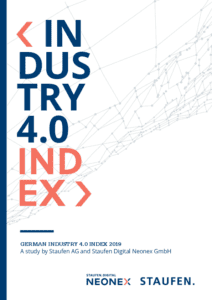
Study: German Industry 4.0 Index 2019
As part of the German Industry 4.0 Index 2019, consulting firm Staufen AG and Staufen Digital Neonex GmbH surveyed a total of 323 companies in Germany on the topic of Industry 4.0 and digitization. The survey was conducted in July 2019. Nearly 70 percent of the companies surveyed are in the mechanical and plant engineering, electrical engineering, and automotive industries.

Study: Aero Space 2019: Leadership in times of change
LEADERSHIP IN TIMES OF CHANGE: For the study “Aerospace 2019 – Leader-ship in times of change,” the consulting company Staufen together with the Federal Association of the German Aerospace Industry (BDLI) surveyed a total of 72 executives from the aerospace industry in Germany in early 2019.Every second respondent in the study comes from top management, meaning an owner, director or executive manager.
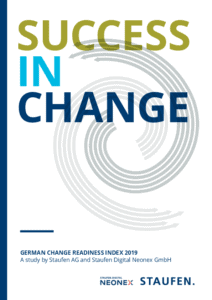
Study: Success in Change 2019: German Change Readiness Index 2019
The Staufen business consultancy surveyed a total of 421 companies in Germany on the subject of “Success in Change” for the German “Change Readiness Index 2019.” The survey took place in the spring of 2019 and was conducted a second time in 2017.
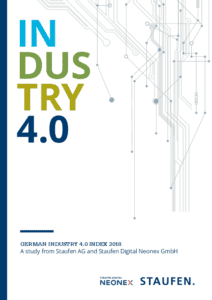
Study: German Industry 4.0 Index 2018
A study from Staufen AG and Staufen Digital Neonex GmbH – For the “German Industry 4.0 Index 2018,” business consultancy Staufen AG and Staufen Digital Neonex GmbH surveyed a total of 450 companies in Germany on the topic of Industry 4.0. The survey was conducted in mid-2018. A good two thirds of the companies surveyed come from the mechanical and plant engineering, electrical engineering and automotive industries.
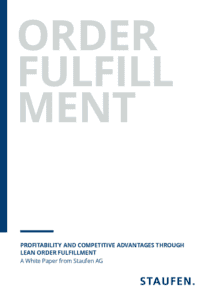
White paper: Order fulfillment in mechanical engineering 2018
The mechanical and plant engineering industry in Germany is facing major changes. The focus is no longer on the product as a masterpiece of German engineering, but on complete product/service packages. What is needed are solution providers who know their customers’ needs and processes inside out and offer them tailor-made solutions.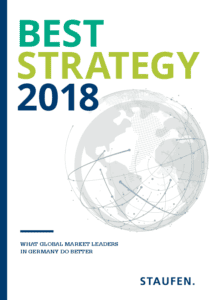
Study Best Strategy 2018: What global market leaders in Germany do better
For the spring 2018 “Best Strategy 2018: What global market leaders in Germany do better,” the corporate consultant Staufen conducted a survey of a total of 210 German companies that were global market leaders either in their industry or in their segment. 40% of these companies are global players with annual sales of over €500 million. Of those who responded in the survey, 42% were owners, members of the executive board or CEOs, and another 38% were division heads. The companies predominantly represented the automotive industry, mechanical and plant engineering, and the electronic industry.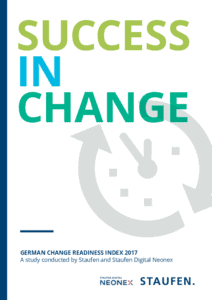
Study: Sucess in Change 2017
For the “Change Readiness Index 2017”, Staufen Consultancy surveyed a total of 658 companies in Germany on the topic of “Success in Transformation” in the spring of 2017. More than 60 percent of the companies surveyed are in the mechanical and plant engineering, electronics and automobile industries.
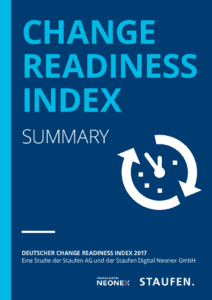
Management Summary: Erfolg im Wandel 2017 (German)
For the “Change Readiness Index 2017”, Staufen Consultancy surveyed a total of 658 companies in Germany on the topic of “Success in Transformation” in the spring of 2017. More than 60 percent of the companies surveyed are in the mechanical and plant engineering, electronics and automobile industries.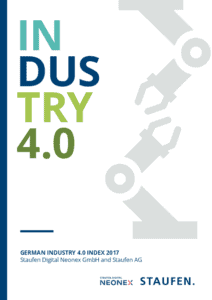
Study: German Industry 4.0 Index 2017
For the German Industry 4.0 Index 2017, Staufen AG, together with Staufen Digital Neonex GmbH, surveyed a total of 394 German companies. More than 70 percent of the companies surveyed were from the mechanical and plant engineering, automotive and electronics industry.

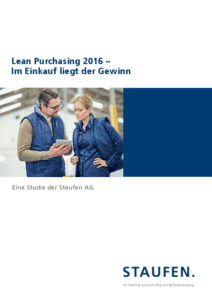
Study: Lean Purchasing 2016 (German)
Cost considerations often play only a secondary role in purchasing for German manufacturers. Only 41% of companies with over 1,000 employees calculate a detailed total cost of ownership in selecting their suppliers. This figure is even lower among smaller companies — a mere 24%. Staufen polled over 100 manufacturing companies in Germany for this research.
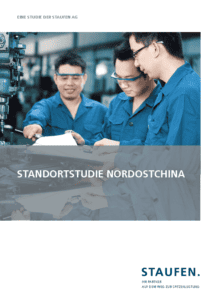
Study on northeastern China 2016 (German)
The German industry is continuing to set its sites on strong growth in China. The companies which are already present on the Chinese market intend to expand significantly: within a decade, a solid quarter of them plan to generate up to half of their total revenue in China. These were the findings of the Staufen site study which surveyed over 400 managers from German manufacturing companies.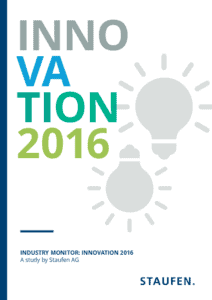
Study Industry Monitor: Innovation 2016
Three-quarters of German manufacturers currently report that they are under major pressure to innovate. The companies most strongly affected are the electroindustry, the automotive industry and mechanical and plant engineering. For eight in ten companies, successful innovations are more important today than they were in the past, according to the results of a survey of 168 German manufacturers.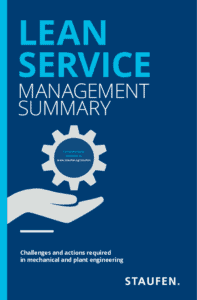
Management Summary: Study Lean Service in Mechanical and Plant Engineering 2016
German experts in mechanical and plant engineering continue to prioritize classic services – and they do not make full use of the innovative potential of digitization. Only one in ten companies consistently take a proactive approach, continuously review their mechanical processes on the client side and take action before difficulties can cause mechanical downtime. The survey covered 154 companies in the mechanical and plant engineering industry.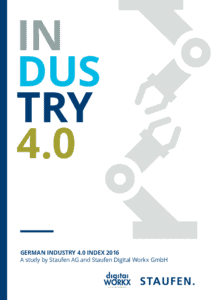
Study: German Industry 4.0 Index 2016
The German Industry 4.0 Index grew for the second year in a row. In the meantime, four in ten companies have had direct experience with smart industry. The index, which was generated for the third time, was commissioned by Staufen and surveyed 277 businesses in Germany.
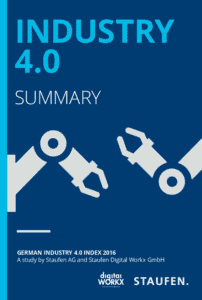
Management Summary: German Industry 4.0 Index 2016
The German Industry 4.0 Index grew for the second year in a row. In the meantime, four in ten companies have had direct experience with smart industry. The index, which was generated for the third time, was commissioned by Staufen and surveyed 277 businesses in Germany.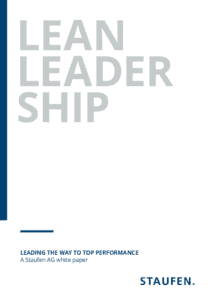
White paper: Lean Leadership 2016
It has been a few years since the first projects to introduce Shop Floor Management were implemented, and over the course of these years we have executed numerous success-ful implementation projects with our customers and BestPractice partners. As a result of introducing Shop Floor Management, many managers have come a long way. Daily Shop Floor Management is now being actively implemented by these managers, who lead in accordance with the defined tools: they ask open-ended questions, enable employees and offer them support.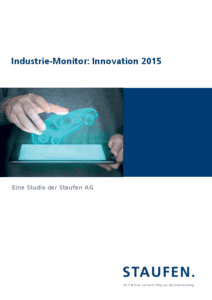
Study Industry Monitor: Innovation 2015 (German)
The German industry is failing to leverage its innovative potential: Nine in ten manufacturers report the pressure of increasing the numbers of new developments and accelerating their development times. The necessary framework is often not in place to put these goals into practice, however. In almost one in every three companies, work on innovations takes place during overtime or after office hours. And nearly two-thirds of German manufacturers regard themselves as pioneers in the field of innovation. These were the findings of the Industry Monitor: Innovation 2015.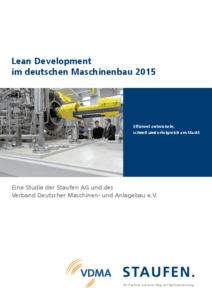
Study: Lean development in the German mechanical engineering 2015 (German)
Failure to meet deadlines, going over budget, losses in quality — nearly four in ten development projects in German mechanical and plant engineering fail to meet their targets. This was the outcome of a study Staufen conducted jointly with Germany’s Mechanical Engineering Industry Association (VDMA). It appears that the principles of efficient and effective development projects are applied in a wide range of ways among German mechanical and plant engineers.
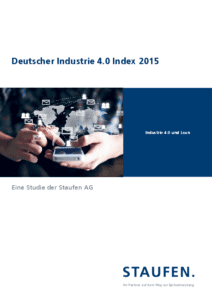
Study: German Industry 4.0 Index 2015 (German)
Manufacturing companies are anticipating changes due to I4.0: 57% of German manufacturers state that their business model will tangibly change within the next five years due to smart factories and connected products. This was the take-home message of the German Industry 4.0 Index, which Staufen conducted for the second time in 2015.
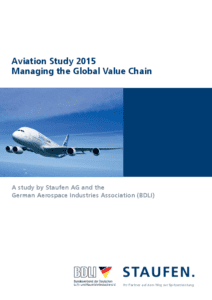
Study: Aviation 2015
The German aviation industry will transfer more and more of its development and processing capacities to Asia in the years ahead. There is the threat of local plants closing, especially among the larger players in the field, according to the findings of the 2015 aviation study. Staufen and the German Aerospace Industries Association (BDLI) spoke to over 100 manufacturers in the German aviation industry.
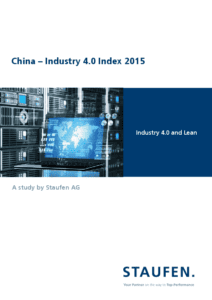
Study China – Industry 4.0 Index 2015
In the meantime, half of all Chinese manufacturers have the topic of intelligent factories on their agenda. And 80% of Swiss manufacturing companies are convinced that Industry 4.0 will be linked to major commercial success for them, according to the findings of an international study entitled “Industry 4.0 Index 2015.” A total of 329 manufacturers in Switzerland, Germany and China were surveyed for the index, which was conducted in the summer of 2015.
More things to know

Podcast
In times of rapid, sometimes even disruptive change, an organization’s ability to adapt and change is the success factor par excellence. Without a finely tuned culture of change that promotes a pioneering spirit and personal responsibility, it will not be possible to successfully anticipate future developments. In our podcast, business leaders and innovators discuss the challenges ahead as well as new ways and opportunities to flexibly adapt to them.
Read more
